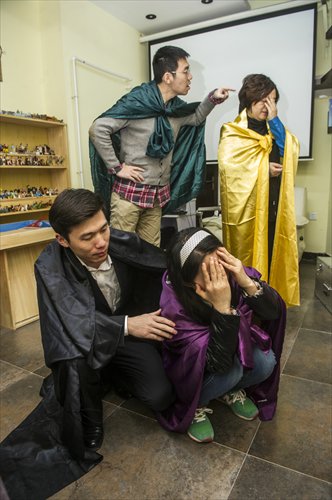

By acting out the scenes of their traumatic memories, patients can come to a different understanding of what happened to them. Photo: Li Hao/GT
Psychodrama treatment can unknot pent-up traumas
After more than two decades tormented by a preternatural fear of authority figures, 32-year-old nurse Pei Zhen finally unearthed the buried memory that was the cause of her anxiety, through a novel form of treatment known as psychodrama therapy.
The treatment, which requires patients to participate in a reenactment of the scene of their traumatic memory, made Pei realize that she had never come to terms with a childhood recollection of her father threatening her mother with a knife.
"In psychodrama therapy, participants act out past traumatic situations in the present, which allows them to unburden themselves of the negative emotions associated with the memory," said You Jinlin, a psychodrama therapist who treated Pei in Beijing in March.
"The participant is then guided to question and reevaluate their understanding of the memory, in order to overcome the trauma so they can move on with their lives."
You guided Pei through a reenactment of the scene, with You's students playing the roles of her mother, her father, and herself. Throughout the reenactment, You gently prodded Pei with questions that would lead her to a better understanding of what she had witnessed all those years ago.
"What are you thinking, what do you want to do now?" You asked.
"I want to protect my mother and myself, I want to throw my father out of the house," Pei shouted in reply.
You encouraged Pei to do just that. Pei rushed onto the stage, wrenched the knife from the hands of the man playing her father, and pushed him off the stage with all her might.
And then, she cried. Over the past 10 years, Pei had changed jobs 12 times. Each time she would have to deal with a superior at work, she would begin to panic. Her sense of panic would incrementally increase with each interaction, until it became unbearable, and she could not but resign.
"The traumatic memory of her father's violent behavior against her mother manifested itself in Pei's irrational fear of her work superiors, who were all severe, middle-aged men," said You. "Psychodrama therapy helps to externalize the traumatic memory, allowing patients alter their understanding of it."
Developed by Austrian-American psychiatrist Jacob L. Moreno (1889-1947), psychodrama therapy remains novel in China. Accreditation can only be given by the American Board of Examiners in Psychodrama, Sociometry and Group Psychotherapy, and at present, there are only two certified practitioners, known as psychodrama directors, based on the mainland: Wang Erdong and Sang Zhiqin, both of whom work in Jiangsu Province.
You, whose practice is based in Taiwan, has taken to conducting workshops in Beijing in response to the shortfall - to help those suffering from mental illnesses, and to train mental health professionals who want to learn more about psychodrama therapy.
"More and more Chinese people are interested in psychodrama therapy," said You. "It's proven to be very effective. Most patients find that their condition drastically improves within three sessions."
As for Pei, after the first reenactment, You guided her through another role-play, in which she confronted the actor playing her father about what had happened all those years ago.
You told Pei that it was not enough to have simply experienced the catharsis of reliving her traumatic memory, but that in order to truly move on, she would have to be able to understand what happened in a different light.
"Why were you always so hot-headed back then? Why did you always hit my mother and me?" Pei asked the man playing her father.
"I'm sorry kiddo," replied the man playing her father. "Your grandfather was also a manual laborer like me, and when I was a kid, whenever I did something wrong, he would beat me."
In the end, Pei embraced the man playing her father.
"Pei needed to understand why her father did what he did, in order to forgive him," You explained. "She needed to forgive him in order to move on."
You said that Pei's relationship with her father had improved considerably since undergoing psychodrama therapy.
"She's been in her current job for more than a year and a half now, instead of running away in fear of her boss," You said.
Copyright ©1999-2018
Chinanews.com. All rights reserved.
Reproduction in whole or in part without permission is prohibited.